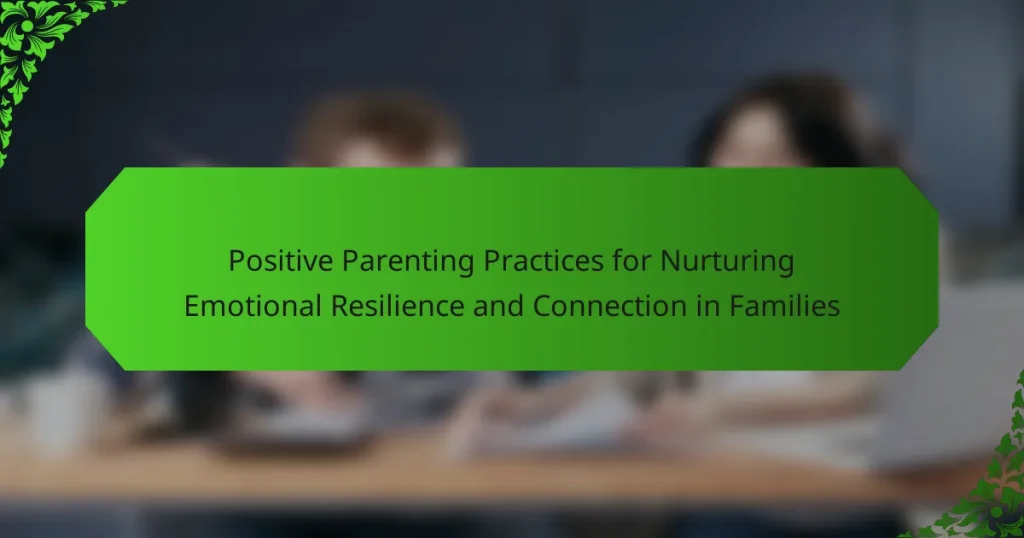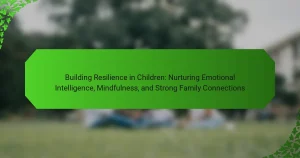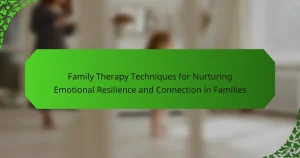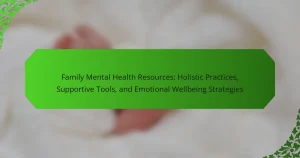Building emotional resilience and connection in families is essential for children’s development. Positive parenting practices emphasize empathy, communication, and support. Key strategies include active listening, validating feelings, and encouraging problem-solving. Implementing consistent routines and promoting emotional awareness further enhance family bonds and children’s emotional well-being.
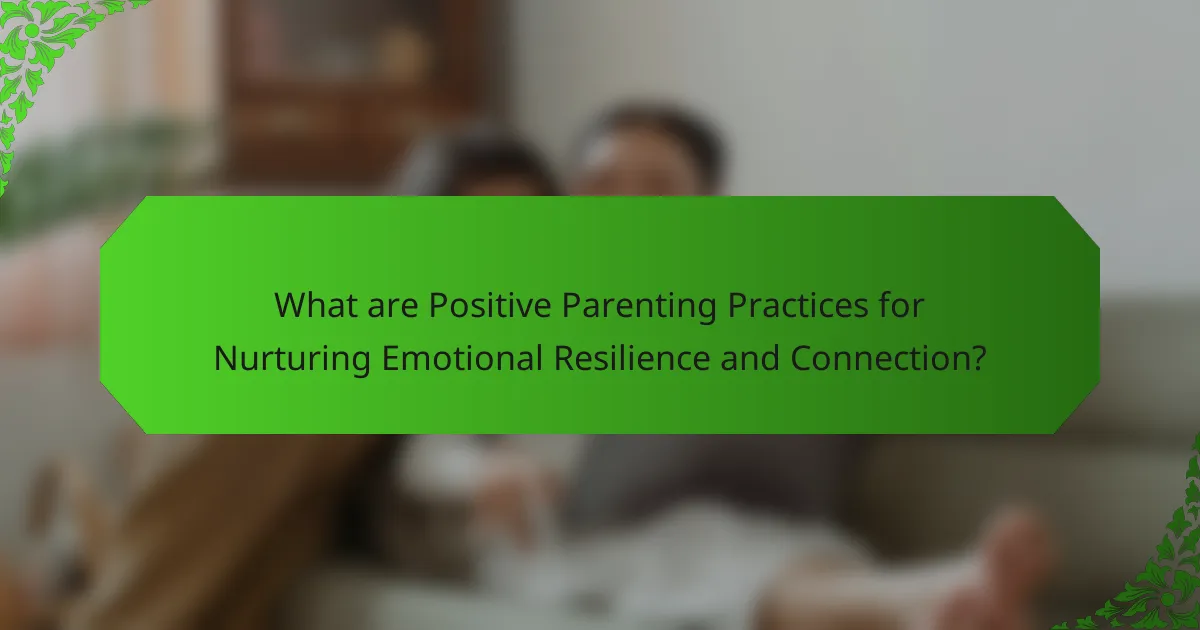
What are Positive Parenting Practices for Nurturing Emotional Resilience and Connection?
Positive parenting practices foster emotional resilience and connection by emphasizing empathy, communication, and support. Key strategies include active listening, validating feelings, and encouraging problem-solving. These practices create a nurturing environment where children feel safe to express emotions and develop coping skills. Research shows that children raised in such environments demonstrate higher emotional intelligence and better social skills. Engaging in shared activities further strengthens family bonds, enhancing overall emotional well-being.
How do positive parenting practices impact emotional resilience in children?
Positive parenting practices significantly enhance emotional resilience in children by fostering secure attachments and promoting healthy emotional expression. These practices, such as active listening and positive reinforcement, empower children to navigate challenges and develop coping strategies. Research indicates that children raised in supportive environments exhibit greater emotional regulation and adaptability. Consequently, positive parenting not only strengthens family connections but also equips children with essential skills for managing stress and adversity throughout their lives.
What role does emotional connection play in family dynamics?
Emotional connection is crucial in family dynamics as it fosters trust and security. Strong emotional bonds enhance communication, reduce conflict, and promote resilience. Families with deep emotional ties are better equipped to navigate challenges together, leading to healthier relationships. Research shows that children who experience strong emotional connections are more likely to develop emotional intelligence and coping skills. This connection not only impacts individual well-being but also strengthens the family unit as a whole.

What are the universal attributes of positive parenting practices?
Positive parenting practices universally emphasize empathy, communication, consistency, and support. These attributes foster emotional resilience and strengthen family connections. Empathy involves understanding children’s feelings, while effective communication ensures children feel heard. Consistency in rules and expectations provides stability, and support encourages children to explore and learn. These elements collectively nurture a positive environment for growth.
What core principles define positive parenting?
Positive parenting is defined by principles that foster emotional resilience and connection within families. Key principles include nurturing a child’s emotional intelligence, promoting open communication, and setting consistent boundaries. These practices encourage a supportive environment, enabling children to thrive emotionally and socially. Additionally, positive parenting emphasizes the importance of modeling behavior, which reinforces values and skills in children. By prioritizing empathy and understanding, parents can cultivate strong, healthy relationships with their children, ultimately enhancing family dynamics and well-being.
How does effective communication foster emotional resilience?
Effective communication fosters emotional resilience by creating a supportive environment for expression. Positive parenting practices emphasize open dialogue, allowing children to articulate feelings and thoughts. This process builds trust and strengthens family connections. As a result, children develop coping skills essential for managing stress and adversity. Studies show that children with strong communication skills exhibit greater emotional stability and resilience in challenging situations.
What are the benefits of active listening in family interactions?
Active listening enhances family interactions by fostering trust, empathy, and understanding. It encourages open communication, allowing family members to express feelings and concerns without fear of judgment. This practice strengthens emotional bonds, promoting resilience in children by modeling effective communication skills. As a result, families experience improved conflict resolution and a supportive environment, essential for emotional development.

What unique attributes distinguish effective positive parenting strategies?
Effective positive parenting strategies are distinguished by their focus on emotional connection, empathy, and consistent communication. These unique attributes foster resilience in children and strengthen family bonds. Strategies such as active listening, setting clear expectations, and modeling positive behavior create a nurturing environment. Additionally, incorporating routines and encouraging independence are rare attributes that enhance emotional stability. These practices empower children to navigate challenges confidently, promoting long-term emotional well-being.
How can empathy be cultivated within the family?
Empathy can be cultivated within the family through consistent communication, active listening, and shared experiences. Engage in open discussions where each member expresses feelings without judgment. Encourage collaborative activities that foster teamwork and understanding, such as family games or projects. Model empathetic behavior by acknowledging emotions and validating experiences. Regularly practice gratitude and appreciation to strengthen emotional connections. These practices enhance emotional resilience and create a supportive family environment.
What are the effects of setting healthy boundaries?
Setting healthy boundaries fosters emotional resilience and strengthens family connections. It promotes mutual respect and understanding among family members. Children learn to express their feelings and needs effectively, leading to improved self-esteem. Healthy boundaries also reduce conflicts, creating a more harmonious home environment. As a result, families can nurture deeper emotional bonds and support each other’s growth.

What rare attributes enhance the effectiveness of positive parenting?
Empathy, active listening, and consistency are rare attributes that enhance positive parenting effectiveness. Empathy fosters emotional connection, allowing children to feel understood. Active listening promotes open communication, encouraging children to express themselves. Consistency builds trust and security, essential for emotional resilience. These attributes create a nurturing environment that supports healthy family dynamics.
How can cultural sensitivity improve family connections?
Cultural sensitivity enhances family connections by fostering understanding and respect among members. It encourages open communication, allowing families to share diverse perspectives. This practice builds emotional resilience as members learn to navigate differences with empathy. As a result, families experience stronger bonds and improved conflict resolution.
What role does playfulness have in building resilience?
Playfulness significantly enhances emotional resilience in children by fostering a supportive environment. Engaging in playful activities allows children to express emotions, manage stress, and develop problem-solving skills. As a result, families that incorporate playfulness into their routines cultivate stronger emotional connections and adaptability in challenging situations. Research shows that playful interactions improve communication and trust, which are essential for resilience. Furthermore, playfulness encourages creativity, enabling children to approach difficulties with a positive mindset.
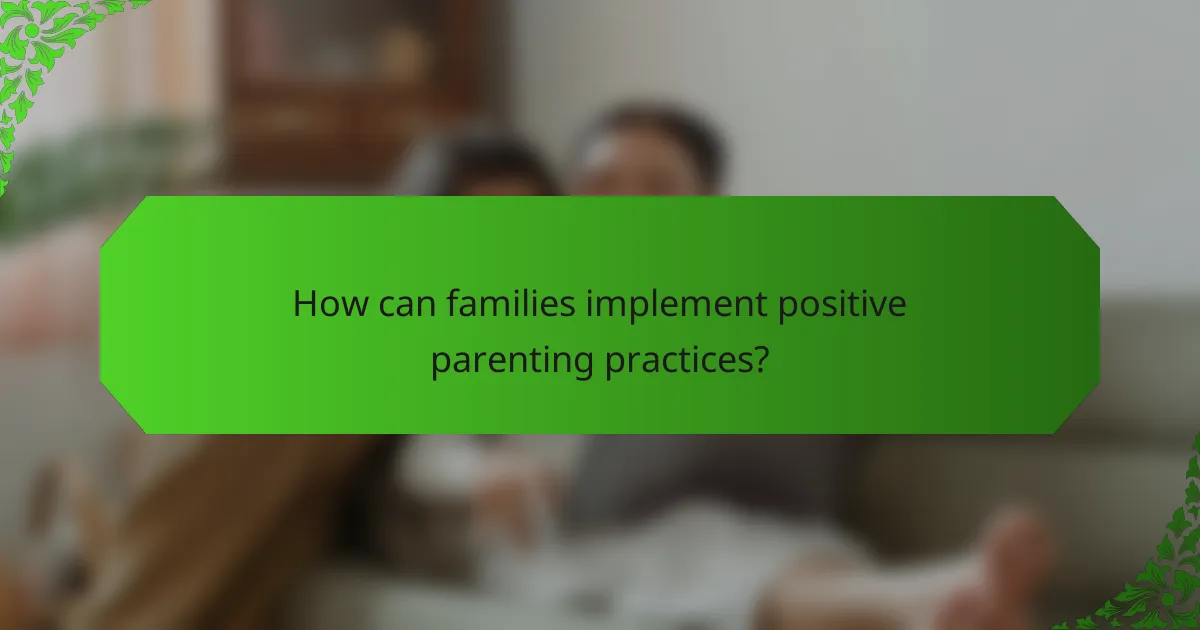
How can families implement positive parenting practices?
Families can implement positive parenting practices by fostering open communication, setting clear expectations, and promoting emotional awareness. These practices nurture emotional resilience and strengthen family connections.
Encourage regular family meetings to discuss feelings and experiences. This builds trust and allows children to express themselves freely.
Model emotional regulation by demonstrating how to handle stress and disappointment. Children learn by observing their parents’ responses to challenges.
Implement consistent routines that provide stability and predictability. Routines help children feel secure and understand expectations, enhancing their emotional resilience.
Use positive reinforcement to acknowledge efforts and achievements. This boosts children’s self-esteem and encourages them to embrace challenges.
What are practical steps to improve emotional resilience in children?
To improve emotional resilience in children, parents can adopt several practical steps. Encourage open communication by creating a safe space for children to express their feelings. Teach problem-solving skills through age-appropriate challenges, allowing them to experience success and failure. Model emotional regulation by demonstrating how to manage stress and frustration. Foster social connections by promoting friendships and teamwork, which enhances their support network. Lastly, instill a growth mindset by praising effort over outcomes, helping children view challenges as opportunities for growth.
How can families create a supportive environment?
Families can create a supportive environment by fostering open communication and emotional safety. Establishing routines and setting clear expectations enhances stability. Engaging in shared activities strengthens connections and promotes resilience. Additionally, practicing empathy and active listening nurtures trust and understanding among family members.
What activities promote emotional bonding among family members?
Engaging in activities like family game nights, cooking together, and outdoor adventures fosters emotional bonding among family members. These shared experiences enhance communication and build trust. Regularly scheduled activities, such as weekly family meetings, can also strengthen connections by allowing members to express feelings and support one another. Prioritizing quality time together is essential for nurturing emotional resilience in families.
What common mistakes should families avoid in positive parenting?
Families should avoid common mistakes like inconsistent discipline, neglecting emotional needs, and failing to model positive behavior. These errors can hinder emotional resilience and connection.
1. Inconsistent discipline leads to confusion and insecurity in children.
2. Neglecting emotional needs can cause feelings of isolation and low self-esteem.
3. Failing to model positive behavior undermines the lessons parents aim to teach.
4. Overemphasizing achievement can create unnecessary pressure and anxiety.
5. Ignoring the importance of open communication can stifle emotional expression.
6. Relying solely on rewards can diminish intrinsic motivation.
What expert insights can guide families in nurturing emotional resilience?
Positive parenting practices foster emotional resilience by promoting open communication, empathy, and problem-solving skills. Families can strengthen connections through regular family meetings, encouraging children to express feelings, and modeling healthy emotional responses. Research shows that children with supportive parenting exhibit higher resilience levels, leading to better stress management and adaptability. Engaging in shared activities, such as family volunteering or creative projects, further enhances emotional bonds and resilience in children.
How can families assess their progress in positive parenting practices?
Families can assess their progress in positive parenting practices by observing changes in their children’s emotional responses and behaviors. Regularly reflect on interactions, such as communication and conflict resolution, to gauge improvement.
Implement structured check-ins, using tools like journals or family meetings, to discuss feelings and experiences. This encourages open dialogue and strengthens connections.
Set specific goals, such as reducing negative behaviors or increasing positive reinforcement, and track achievements over time. Celebrate milestones to maintain motivation and commitment to positive parenting practices.
Utilize feedback from children, asking for their input on family dynamics and emotional support. This unique attribute fosters a sense of agency in children and enhances emotional resilience within the family.
What are the best practices for maintaining emotional connection in families?
To maintain emotional connection in families, prioritize open communication, active listening, and quality time together. Establishing regular family meetings fosters a safe space for sharing feelings. Engaging in shared activities enhances bonding and creates lasting memories. Consistent expressions of love and support build trust, reinforcing emotional resilience.
